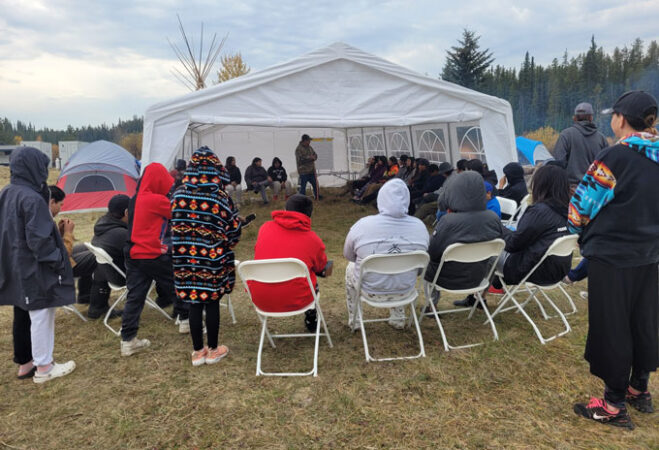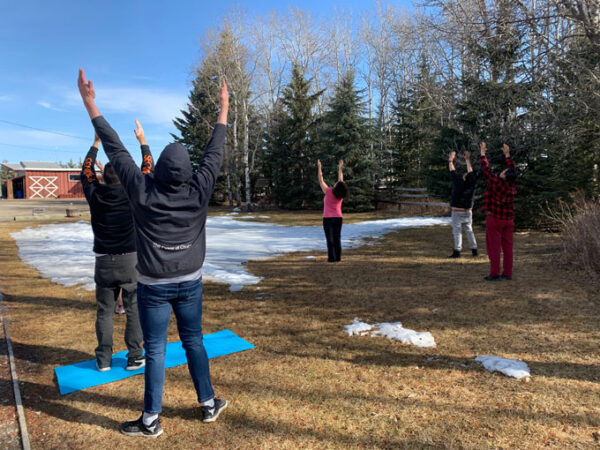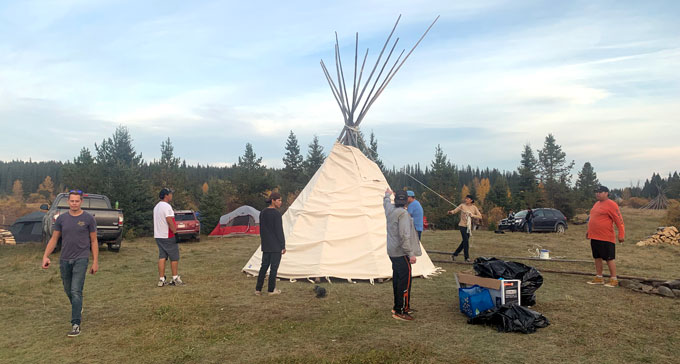[ad_1]
Earlier this 12 months, the main psychological affiliation in the USA apologized to the nation’s Indigenous folks and communities for instantly and not directly supporting centuries of abusive assimilation efforts. These efforts included pushing Indigenous folks off their lands and separating kids from their households for placement in boarding colleges.
The harms of those practices to Indigenous communities are ongoing, the American Psychological Affiliation acknowledged in a report launched in February. As an illustration, culturally inappropriate psychological well being diagnoses and coverings have exacerbated Indigenous communities’ already disproportionately excessive charges of psychological sickness, persistent illness, incarceration and suicide.
By the numbers, American Indian and Alaska Natives report critical psychological misery 2.5 instances as typically as members of the overall inhabitants. They’re nearly 5 instances as more likely to die of alcohol poisoning than the overall inhabitants. And so they have the very best price of suicide of any minority group within the nation.
The APA additionally pledged its dedication to studying about and valuing culturally acceptable approaches to care transferring ahead. “Psychologists working with Native shoppers ought to respect, honor, and embrace Native methods for therapeutic,” reads one bullet level. “Psychologists must study analysis methodologies developed by and for Indigenous populations,” reads one other. APA leaders additionally issued in-person apologies on the June annual assembly of the Society of Indian Psychologists in Logan, Utah, and once more in August on the APA Conference in Washington, D.C.
This apology honors the longstanding, typically underappreciated, efforts of Indigenous and different researchers working with Indigenous communities. Lately, Canada and Australia have issued related apologies to their nations’ Indigenous populations. Such apologies pave the way in which for the type of deep modifications in considering and therapy which are wanted to assist Indigenous communities heal, researchers concerned on this work say.
These researchers anchor therapeutic in Indigenous world views that prioritize concord between folks and the planet. And so they acknowledge the highly effective position historical past performs in shaping well being and well-being. Indigenous psychology is about “wanting on the complete individual — the psychological, the bodily, the religious, the emotional — inside the context of colonization,” says Suzanne Stewart, a psychologist on the College of Toronto and member of the Yellowknife Dene First Nation in Canada.
Particularly, many Indigenous-centered therapies incorporate conventional practices, reminiscent of making crafts from native supplies, accumulating medicinal herbs and interesting in rituals. Underlying such applications is the concept that if the historic trauma of colonization is the issue, then cultural revitalization could possibly be the answer.
This culture-as-treatment method represents a marked departure from Western approaches to care, which frequently reduce historic and cultural context. Assessing the success of these strategies can also be troublesome utilizing measurements typical in Western medication. So researchers working in Indigenous psychology are measuring the effectiveness of these applications by means of qualitative, culturally acceptable strategies, reminiscent of detailed first-person accounts.
Apologies just like the one from APA mark an necessary step ahead, says psychologist Karlee Fellner of the College of Calgary in Canada, and a citizen of the Métis Nation of Alberta. However Feller wonders, can the scientific institution settle for such a radical departure from care and analysis as ordinary? “That’s the query mark.”
Utilizing tradition as therapy
Indigenous understandings of well-being have developed over tens of hundreds of years. These populations should not a monolith; they communicate many languages and interact in myriad cultural practices.
However a golden thread working by means of their perception methods is the concept that well-being stems from a wholesome relationship between folks and their environs, says Patricia Dudgeon, a psychologist and researcher on the College of Western Australia in Perth, and a descendant of the Bardi folks from the Kimberley. These relationships embrace each human and nonhuman relationships, reminiscent of relationships with one’s ancestors, different animals and the land.
In the USA, the thought of restoring this golden thread, or returning to tradition to facilitate therapeutic, gained momentum throughout the Crimson Energy Motion from roughly 1969 to 1979. Activists sought larger autonomy for Tribal nations to guard towards additional assimilation with white tradition. They seen such assimilation as a type of cultural erasure.
The thought of tradition as therapy turned so fashionable that individuals working in Indigenous communities assumed that the method labored, says Harvard College psychologist Joseph P. Gone, a member of the Aaniiih-Gros Ventre tribal nation positioned in Montana. However the concept had gotten forward of the science. Gone and others started to discover the thought extra systematically. These efforts have included formally defining what is supposed by Indigenous psychologies, creating applications that adhere to these world views and figuring out culturally acceptable methods to measure how effectively they work.

Dudgeon and coauthors just lately outlined a definition of Indigenous flourishing they developed at the side of Aboriginal group members. That work, printed in March in Nature Opinions Psychology, means that well-being for Indigenous folks in Australia contains seven domains, all influenced by social, cultural and historic forces, in addition to particular person experiences and persona. These domains embrace thoughts and emotion, physique, household, group, tradition, nation and spirituality. “That [definition] seems on the complete of the individual,” Dudgeon says.
That holistic view, in flip, shapes how researchers take into consideration enhancing Indigenous folks’s well-being. “Simply taking a look at variations in world views, I believe that Western therapeutic is about empowering the person to have management over their setting and so forth. That’s not actually in line with Indigenous world views, the place it’s about relationships,” says psychological well being clinician and researcher Rod McCormick of Thompson Rivers College in Kamloops, Canada. McCormick is a citizen of the Kanienkehaka (Mohawk) Nation.
As an illustration, over a decade in the past, Gone partnered with the Blackfeet Nation in Montana to develop a summer time cultural immersion program for folks combating dependancy. In 2012, Gone helped launch a 12-day pilot program for 4 contributors, described within the 2015 Psychological Providers. Throughout camp, contributors engaged in sweat lodge and pipe ceremonies, pitched tipis, procured and ready meals, harvested sacred crops and tanned hides.
The rationale behind utilizing tradition as therapy is multifaceted, Gone writes. Amongst them, this method can restore Indigenous folks’s connection to the locations and practices — a supply of goal and which means — that colonization eroded. It has the potential to offer folks with a way of spirituality that’s incompatible with substance use. And it might probably assist contributors develop new social networks.
Taking part in cultural actions helps contributors use their cultural previous to chart a brand new path ahead and obtain a larger sense of goal, Gone writes. “By advantage of their participation in camp actions … they have been engaged in crafting practical modern identities and modes of dwelling that have been steady with — moderately than alienated from — that previous.”
Different researchers have modified the idea of Western speak remedy for an Indigenous clientele. Indigenous Focusing Oriented Remedy begins with the concept that trauma in Indigenous communities is intergenerational and formed by colonization, researchers report within the April The Counseling Psychologist. Throughout a typical IFOT session, a therapist and consumer sit dealing with the land in entrance of them moderately than throughout from one another to acknowledge the important hyperlink between place and well-being. Furthermore, moderately than speak about their trauma, as within the Western remedy mannequin, shoppers are inspired to foster their “felt sense” — primarily utilizing the physique’s feelings, energies and sensations to specific data of how one is a component of a bigger net of human and nonhuman relationships.
“IFOT is making use of a Western therapeutic device,” says Fellner who’s educated within the technique. “However what actually makes it completely different is that you’re coming from Indigenous methods of understanding.”
In a presentation eventually month’s Society of Indian Psychologists’ assembly, Fellner and her group described how they took the IFOT mannequin out of the workplace and onto the land. The group held a 24-day pilot program on the base of the Rocky Mountains in Alberta, Canada. Six contributors attended a mix of IFOT remedy classes and land-based actions, reminiscent of making spirit dolls and medicines from native herbs.

“Taking IFOT to the land has confirmed a strong method, says Fellner, who continues to steer this work with communities. She recounts a therapeutic circle she ran earlier this 12 months. A number of elders joined the group at some point and shared traumatic tales of their pasts, reminiscent of experiencing the dying of their grownup kids. “Impulsively once we have been executed sharing, this depraved hailstorm got here in and flooded the tipi. We bumped into the closest constructing once we had the chance. We have been all drying off. The elders have been all laughing,” Fellner recollects. “The land got here and helped us.”
Questioning the gold normal
Rigorous trials of those kinds of cultural therapy applications stay uncommon. The explanation why embrace difficulties in securing funding, low participation charges and questions across the cultural appropriateness of utilizing Western methodology to measure Indigenous psychology.
Gone, as an illustration, couldn’t experimentally check the effectiveness of the Blackfeet cultural immersion program or one other program he helped launch later in Detroit. “In neither occasion did we proceed to get the type of funding that might enable [us] to judge them,” he says. Gone attributes a part of that funding problem to the conservatism of scientific well being businesses that prioritize incremental modifications to current applications over wholly new approaches.
Researchers who do handle to run randomized managed trials, the purported gold normal of scientific measurement, typically discover that cultural therapies don’t work as deliberate, Gone famous in Could 2023 within the Annual Evaluate of Scientific Psychology.
“Most of them discovered that tradition didn’t matter or that in some instances, it led to doubtlessly worse outcomes,” Gone says. However the outcomes are “not large enough to essentially believe within the findings. In order that they’re suggesting that tradition doesn’t matter or that the truth is it’s dangerous however with out the right controls to essentially believe within the findings. That’s unhealthy.”
Recruiting Indigenous contributors to such research is extremely difficult, McCormick says. “Individuals don’t wish to take part in experimental analysis a lot. We now have obtained a foul historical past with analysis. Analysis has been executed on us.”
Even when researchers handle to recruit sufficient contributors, many drop out. As an illustration, in one of many six latest randomized trials Gone reviewed, solely 30 p.c of contributors accomplished 9 or extra of the 13 remedy classes.
The issues with scientific trials, although, are each logistic and cultural. Western psychology rests on sure norms, reminiscent of the idea that habits might be damaged down into discrete items and that individualize prioritize self-reliance and autonomy, the authors of the APA report notice. “The assumptions made by American psychology are contradictory and reductionist in comparison with the advanced, holistic and inter-relational view of well being that has been integral to Indigenous folks for hundreds of years.”
That reductionist method permits researchers to ship the identical therapy to 1 group and examine their outcomes to a different group not receiving the therapy. However that mind-set runs counter to Indigenous understandings of illness and well being.
The established diagnostic and therapy course of, as an illustration, doesn’t account for the historic and ongoing traumas related to colonization, Stewart says. “Western psychology doesn’t actually give causes or causes of psychological well being problems as a result of the Western biomedical mannequin is about remediating signs. You remediate the symptom, the dysfunction goes away.” Cultural revitalization practices, in contrast, are localized to given communities.
And diagnostic labels can amplify historic wrongs. “Diagnoses have vitality, they’ve spirit, they manifest. To diagnose any individual from an Indigenous perspective in that means, we will trigger hurt,” Fellner says.
The worth of firsthand expertise
It may be very troublesome to quantify the outcomes of Indigenous therapeutic practices by Western scientific calculations. As an alternative, Indigenous methodologies bear nearer resemblance to qualitative analysis than quantitative analysis. Additionally they prioritize group involvement in creating therapies and place participant voices on the middle of the info assortment course of.
“Any type of e-book studying or rarified abstracted data from afar is taken into account nearly irrelevant,” Gone says. “There’s nothing higher than firsthand expertise.”

That concept exhibits up within the Nationwide Empowerment Undertaking in Australia. Since 2012, Dudgeon and colleagues have been working with Aboriginal communities throughout Australia to scale back psychological misery. The group companions with Aboriginal organizations in a given group to determine people to coach as group researchers. These researchers then should full sure deliverables, reminiscent of interviewing group members about points associated to well-being, analyzing these findings with the assistance of different undertaking members and writing detailed reviews about their findings.
In addition to illuminating the important thing wants of every group, reminiscent of want for a youth middle or household programming, the method helps flip group researchers into group leaders, Dudgeon and colleagues reported within the 2017 Worldwide Journal of Qualitative Strategies.
This method empowers communities to take cost of their very own therapeutic, Dudgeon says. “We don’t go in like massive researchers.”
Different methodologies depend on Indigenous communities’ lengthy custom of oral storytelling. As an illustration, in a observe referred to as yarning, a researcher merely asks contributors to inform their story. Slightly than asking predetermined questions, the researcher has a subject information that tells them what to pay attention for within the story, researchers write in December 2022 within the Worldwide Journal for Fairness in Well being.
The authors of that assessment of 46 yarning research sought to grasp how researchers have been utilizing the strategy in health-related research. Additionally they investigated the position, if any, that Indigenous researchers performed within the course of.
Extra rigor is required in analysis that makes use of the method, the authors discovered. However that rigor bears little resemblance to Western strategies. As an illustration, the authors famous that lots of the researchers conducting interviews did not disclose their very own lived expertise, reminiscent of ethnic background or connection to a given land. However acknowledging that context is integral to the yarning course of, because it shapes the facility dynamics between interviewer and interviewee.
With regards to evaluating such applications, even participant enthusiasm gives some proof of success, researchers say. As an illustration, the Blackfeet summer time cultural immersion program Gone helped develop continued effectively after funding for this system ended. That indicated that a very powerful gamers, the shoppers, discovered therapeutic within the culture-as-treatment method, Gone notes.
Fellner reviews the same expertise. “We don’t want a randomized managed trial to know that Indigenous Focusing Oriented Remedy works,” she says. “That is working a lot that the IFOT people haven’t had time to publish.”
However with most psychology coaching grounded in Western considering and methodology, can institution psychologists settle for strategies that deviate so removed from the established order? Solely time will inform, Fellner says. “With all these apologies, with all these motion gadgets, my hope is that that they are going to present us that they actually imply it by acknowledging and honoring Indigenous methods of proof.”
[ad_2]

